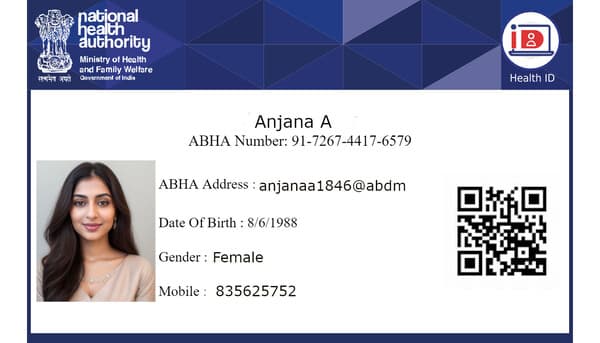Unlocking the Future of Healthcare: Understanding ABHA

Abstract
ABHA, or Ayushman Bharat Health Account, revolutionizes healthcare in India by providing a unique identifier for citizens, streamlining health records, and addressing the challenges of disjointed information. This initiative enhances medical efficiency, reduces redundant tests, and fosters a more cohesive healthcare system. Nice HMS, a certified HIMS, simplifies ABHA card generation with Aadhar verification. The card's dual components - ABHA number and address - empower patients to control their health data's privacy. ABHA facilitates seamless health record access across hospitals, promoting authorized information sharing. Additionally, ABHA's impact extends beyond healthcare, potentially improving third-party administrator management through emerging Health Information Exchanges.Introduction
In the ever-evolving landscape of healthcare, the Ayushman Bharat Health Account (ABHA) emerges as a transformative initiative for every Indian citizen. This distinctive identifier acts as a linchpin for consolidating health records, overcoming the challenges posed by scattered information across various healthcare providers. The lack of connectivity in the current system often results in confusion, unnecessary investigations, and potentially unwarranted treatments.
Organizing Healthcare: The Role of ABHA
Recognizing the pivotal role of a patient's medical history in effective healthcare provision, ABHA seeks to revolutionize the healthcare landscape by organizing health records. The goal is to make pertinent information readily accessible to medical professionals, potentially enhancing the efficiency of medical treatments, reducing redundant tests, and fostering a more streamlined healthcare system for the benefit of all citizens.
Components of ABHA: Number and Address
The ABHA card comprises two main components: the ABHA number and the ABHA address. While each citizen can have only one ABHA number linked to their Aadhar card, they have the flexibility to link multiple ABHA addresses to a single ABHA number and Aadhar. This innovative approach empowers patients to maintain the privacy of their health records under specific ABHA addresses.
Flexibility and Control
Citizens also have the flexibility to discontinue their ABHA card and create a new ABHA number, linked subsequently to Aadhar. However, it's crucial to note that only one Aadhar-linked ABHA number can be active at any given time. Nevertheless, citizens can obtain additional ABHA numbers using documents such as a driving license or voter card, providing them with a level of control over their health data.
ABHA and Health Records: Connecting the Dots
In the context of health records, patient data generated at hospitals often remains within the confines of the respective institution. ABHA addresses act as unique identifiers across all hospitals in India, providing a bridge between disparate systems. The data, formatted in prescribed standards like HL7 FHIR, is securely indexed in the consent manager of the National Health Authority (NHA) gateway. This registry, devoid of actual patient data, contains only links to patient records.
When a patient requests or consents for another hospital to access their health records, a secure digital copy of the patient's records is transferred. This ensures authorized and seamless access to health information across different healthcare facilities in the country.
Personal Health Record Apps and Beyond
In the age of digitization, citizens can leverage Personal Health Record (PHR) apps to access their records, with provisions for storing them in Digilocker. Consent for access to patient records is granted through these PHR apps, providing patients with control over who accesses their data and for how long. Importantly, patients can filter records and limit the duration of access, ensuring a balance between privacy and necessary information sharing.
How to Generate ABHA Card: Nice HMS Implementation
Nice HMS, a certified Health Information Management System (HIMS) with the prestigious ABDM triple milestone certification, simplifies the process of generating ABHA cards. All that is required is the Aadhar card of the patient and the mobile number connected to that Aadhar for OTP purposes. Nice HMS has implemented a straightforward flow in this regard, ensuring a user-friendly experience.
How ABHA Card Benefits Hospitals
The ABHA card significantly streamlines the registration process for hospitals. There are two primary methods for registering ABHA patients. Firstly, the Health Information Management System (HIMS) should be ABDM triple milestone certified, as exemplified by Nice HMS. The registration can be done through OTP-based verification or by scanning the QR code on the ABHA card, either by hospital staff or the patient scanning the hospital's QR code from the Health Facility Registry.
Beyond Healthcare: ABHA and Financial Data
While ABHA itself does not directly link to financial transactions, the emergence of Health Information Exchanges (HCX) introduces new possibilities. Insurance companies may identify policyholders using ABHA addresses, potentially streamlining processes and improving Third-Party Administrator (TPA) management in India.
Conclusion
In conclusion, ABHA stands as a beacon of progress in India's healthcare landscape. By addressing the challenges of fragmented health records, it has the potential to transform healthcare delivery, providing citizens with better control over their health information. Nice HMS's implementation further illustrates the user-friendly approach to generating ABHA cards, making the process accessible to all. As we navigate the evolving landscape of healthcare technology, ABHA emerges as a pivotal force, unlocking a future where information flows seamlessly for the benefit of all.
This Unlock the Future of Healthcare Management! 🚀🏥🌟
Is managing your hospital, clinic, or lab becoming a daunting task? Experience the ease and efficiency of our cutting-edge Management Software through a personalized demo.
